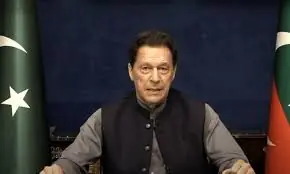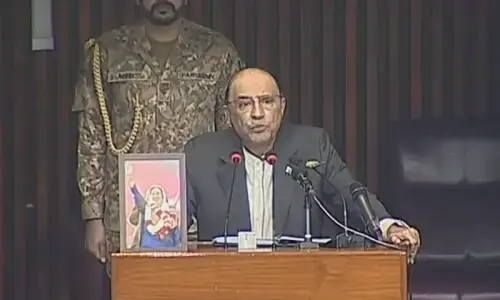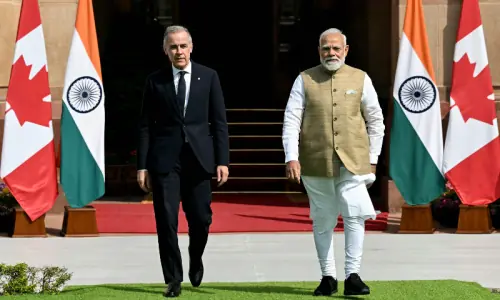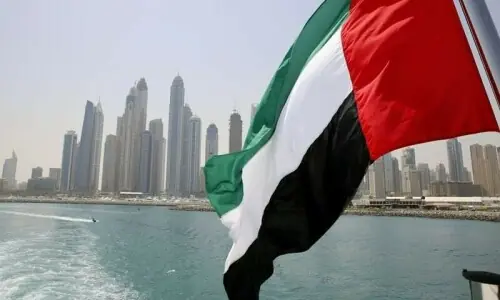The re-election issue
EACH passing day confirms that the mode of the next presidential election will not be normal. On Sunday, Mr Shaukat Aziz confirmed what other ruling party leaders have been saying from time to time about an issue that will determine, or perhaps destroy, the nation’s democratic aspirations for the next five years. Addressing a press conference in Islamabad, the prime minister said the existing assemblies would re-elect President Pervez Musharraf for another term and hinted that the life of the assemblies could be extended by another year. It now remains to be seen whether the government will come out with a retraction of what Mr Aziz said on Sunday in such categorical terms. Earlier, Minister of State for Information Tariq Azeem had even given a timetable of sorts for presidential and general elections but was indirectly snubbed when Information Minister Mohammad Ali Durrani rebutted Mr Azeem’s claim the next day. With the prime minister now going public with it, there is little possibility that the re-election mode will be changed. President Musharraf himself has not said anything about the way he will be re-elected, though he has said several times that he wants to be at the helm for some time more in ‘national interests’. Unless the president contradicts the prime minister, or Mr Aziz himself comes up with a denial or correction, it is obvious that the issue has been finally settled, and all we can do is to prepare ourselves for another five years of undiluted military rule.
Clichéd it may sound, because so many people have said it, but it is indeed true that our purblind leaders — both military and civilian — have learnt nothing from history, for one is appalled to see the consistency in the behaviour of ‘saviours’ from Ayub to Musharraf. The generals demonise politicians, and it is true that some of them in power have often behaved undemocratically and been guilty of corruption. But the truth is that Z.A. Bhutto, Mohammad Khan Junejo, Benazir Bhutto and Nawaz Sharif came to power not through the back door but by democratic means. Ignoring those who fell victim to the arbitrary 58-2b clause in the Constitution, at least two of them — Z.A. Bhutto and Nawaz Sharif — were removed by ambitious Bonapartists. Once in power through a coup d’etat, the so-called saviour — promising to restore democracy after sorting out ‘the mess’ — managed to hold on to power for a decade by perversion of the constitutional process. Ayub and Zia both held so-called referenda and managed to get an over 98 per cent yes vote, and Gen Musharraf followed suit. Constitutions were abolished or mauled to give the nation a new ‘system’. But in the case
of Ayub and Zia, the system collapsed once they were out of office. Does the general-president want to follow in the footsteps of his predecessors?
One day President Musharraf will leave the scene, as all mortals are destined to, but the world will continue to note with regret that even 60 years after independence, Pakistan has not been able to develop a democratic system and institutions. This is a pity for a nation that had, for historical reasons, an excellent opportunity to practise a genuine democratic system bequeathed to it by the Raj. The greater pity is that all this should have happened to a country founded by a constitutionalist like Jinnah whose entire struggle for the creation of Pakistan was democratic.
Mirwaiz’s sane advice
THE appeal by the chairman of the All Parties Hurriyat Conference to the militants to declare a temporary ceasefire in Kashmir deserves a positive response from those who have opted for an armed struggle in the disputed valley. Given the regional scenario and the war on terror, it is now more unlikely than ever before that the Kashmiris can win self-determination through a recourse to violence. If anything, it can negate the possibilities of a political settlement, the prospects for which are brighter today than in the past. With the APHC talking to the Pakistan and the Indian governments and the leaders of Azad Kashmir, it makes sense that a political approach be given a fair chance. That is precisely what the Mirwaiz is now seeking. No one doubts the concern that Umar Farooq feels for the rights of the Kashmiris. His pragmatism and good faith cannot be questioned.
A temporary truce has been tried once before in the valley and has failed to produce results. But that was in November 2000 when a unilateral ceasefire was announced by the Indian government under American pressure. With the APHC a unified force in those days and Pakistan backing the fighters in Kashmir, there was little opening for the moderates to create conditions for a dialogue between the various elements which need to be brought to the negotiating table. Today the situation has changed in favour of a political solution. The APHC has moderated its stance and the hardliners have been marginalised. While the parties talk, there is no reason why some interim measures should not be considered. The foremost need is to end human rights violations in Kashmir and bring normality to the besieged state. This would create a climate conducive to a dialogue. A ceasefire by the militants at this stage would create pressure on the Indians to abandon the policy of suppression and lower the level of violence in the valley. This should give some breathing space to Kashmiri parties of all hues to draw up their political agenda for talks. But for this the militants will have to heed the advice given by the Mirwaiz and abandon the path of violence.
Still without a constitution
WHY should cricket fare any better when the entire country is run on an ad hoc basis? But cynicism aside, the game deserves better treatment than what has been on show for almost eight years now. It was in July 1999 that President Rafiq Tarrar, in his capacity as PCB patron, suspended the cricket board’s constitution, sacked its chairman and replaced him with the brother of a Nawaz Sharif crony. Ad hoc committee chiefs have come and gone since then, the latest in this cricketing musical chairs being Nasim Ashraf. Professionalism and whimsy are mutually exclusive, and this is not the way the game ought to be run. Currently there is a shocking lack of accountability in the PCB. As one analyst recently put it, success in cricket is dependent on three key ingredients — talent, funding and good governance. There being no shortage of either money or raw skill in Pakistan cricket, the primary cause of the national team’s woes is easy to pinpoint.
Like his predecessor, Nasim Ashraf continues to play fast and loose with parliament and the country’s unofficial national game. The PCB chairman initially promised the Senate’s standing committee on sports that the board’s new constitution would be in place by December 31, 2006. The committee extended the deadline to the end of January. Now the PCB has again gone back on its word, with no news on when it plans to deliver. Worse, there has been no public debate on the proposed constitution. Drafts have reportedly been sent to President Musharraf and the attorney-general but not to the regional associations, the institutions that matter the most. Pakistan cricket desperately needs a new constitution but a fait accompli is not the answer. Power cannot be concentrated in the hands of a few — the associations must be given due representation and the role of the PCB patron, if this office is at all required, should be reduced to that of a figurehead.
The great game for Middle East oil
IN his state of the union address last month, President Bush, besieged by the mounting opposition to his Iraq policy, once again tried to deflect attention from the “mother of all policy disasters” by changing the subject to focus on his domestic promises. Unfortunately, the latter have been as deceptive as his foreign policy pledges which have totally destroyed his credibility.
In particular, his reiteration of the appeal to his country to break its “addiction” to oil was puzzling considering the president’s long-standing links with the Saudi royal family, which depends vitally not only on a steady flow of oil revenues but also on the underwriting of its security.
Those who expected that Bush, after suffering humiliating military and electoral losses, would attempt to assuage the damage to his presidency by making some bold moves towards an integrated energy and environment strategy, were disappointed. Bush and his presidential cabal are too closely hand in glove with oil interests to take such a radical step.
In any case, the American public, spurred on through the promotion of the profligate American dream by corporate interests in the automobile, oil, retail and utility sectors, has hardly paid much attention to the energy-conserving strategy since Jimmy Carter’s exhortation to treat it as the “moral equivalent of war” (or a jihad against oil), three decades ago.
Concerns over alternate energy sources and exaggerated rumours about its impending displacement as a principal energy source notwithstanding, oil remains the most strategic commodity in the world economy. In recent years, the volatility in oil prices has produced conflicting views about the role of oil in the continued expansion of the economy. The recent pullback in oil prices from their August peak has created unwarranted optimism that oil prices will go down. However, informed forecasts show that oil prices have hit a plateau and are poised to move to a higher peak at the slightest hint of a global crisis. The increased demand for oil in the last decade has stemmed largely from the high growth rates of the two large Asian economies of China and India and of other developing economies.
Being a strategic commodity, oil has played an important role in world politics as well. The two major players currently governing the fate of oil are Saudi Arabia, arguably the most influential producer and exporter of oil and the US, the most powerful consumer and importer of the commodity. The US-Saudi economic relationship, which was non-existent until the late 1930s grew rapidly after the discovery of oil by an American oil company and led to the establishment of Aramco and a political and security relationship which achieved salience during the Cold War.
A series of formal and informal agreements concluded by successive US administrations and dating back to 1951 when the Saudis agreed to a defence assistance pact with Washington including a long-term lease of Dhahran airfield and military deployments demonstrated the strong US security commitment to Saudi Arabia. An American official in 1944, declared, “The oil in this region is the greatest single prize in all history.” Six decades, later his words have never been truer. To protect its strategic interests, the Carter doctrine of 1978 affirmed Washington’s willingness to protect the Gulf’s oil supply at all costs, including the possibility of going to war. The 1991 Gulf war was perhaps the first test and application of the Carter doctrine of the post-Cold War era. The 2003 invasion of Iraq was an even more explicit reaffirmation of that doctrine.
The creation of Israel in 1948 proved to be a low point in US-Saudi relations. The Saudi government was under pressure from its Arab neighbours, especially Iraq and Jordan, to withdraw Aramco’s oil concessions as a protest. Both the need for solidarity with the other Arab countries on the Palestine issue and to strike a better deal on oil with western countries weakened its relationship with the US.
With one-fourth of the world’s proven oil reserves and some of the lowest production costs, Saudi Arabia remains the international community’s largest net oil exporter for the foreseeable future and a strategic power which can’t be easily pushed around. Saudi Arabia commands a central place among its neighbours in the region, with an area geographically larger than all of western Europe. Saudi Arabia is the founding member of the Organisation of the Islamic Conference (which incorporates the entire Muslim world), the Arab League, and the Organisation of Petroleum Export Countries (OPEC). It has enormous political and economic influence in the Middle East.
As the “swing producer” of oil for the global economy, Saudi Arabia virtually has veto power over changes in oil prices. Its clout as a global financial power has increased commensurately with its current account surplus which in recent years has far exceeded the combined surpluses of East Asian economies, including China. Oil has thus endowed Saudi Arabia with considerable economic and political leverage. For instance, it could pull the plug on the dollar by convincing the oil market to use the euro as the standard currency for oil deals and trades.
Geographically, Saudi Arabia could block the transport of goods from one Gulf Cooperation Council (GCC) country to another. It could also choose to stop the flow of oil as it did during the Arab-Israeli war in 1973.
Much less likely, it could stop cooperating on counter-terrorism, which would be debilitating to the war on terror, given the Saudi support of orthodox Sunni causes and groups the world over.
However, with oil export revenues making up around 90-95 per cent of the total Saudi export earnings, 70-80 per cent of state revenues and around 40 per cent of the country’s gross domestic product (GDP), Saudi Arabia’s economy remains, despite attempts at diversification, heavily dependent on oil.
Moreover, its internal and external security depends largely on the supply of arms from the US and other western countries, which consume a substantial proportion of its oil revenues, forcing it to play the oil card with great care and caution.
On the other hand, the United States is the largest consumer of oil and despite its declining importance as an industrial power, it is the world’s largest military power and a leading hegemon. America’s growing dependence on oil, particularly as a transportation fuel, makes its relationship with the Middle East crucial and indispensable. Currently, the United States consumes 25 per cent of the world’s oil while possessing only three per cent of its reserves. The Arab world, in contrast, has shown far less dependence on oil even though it possesses a much larger share of global oil reserves. While it has only five per cent of the world’s population, the United States nevertheless consumes 25 per cent of the world’s oil production. Giving up “oil addiction” is, therefore, not going to be easy.
Ties between the United States and Saudi Arabia, took a nosedive after the 9/11 attacks in which 15 of those allegedly involved, besides its presumptive mastermind, Osama Bin Laden, were Saudi Arabian nationals. Despite the best efforts of the Saudi government to come clean on the issue and to cooperate fully with the US in the war on terrorism, it continues to vitiate the delicate relationship that rests so much on the perception of mutual trust, which has continued to ebb in the face of continuing Afghan and Iraqi insurgency suspected of being bankrolled by Saudi citizens.
The Saudi-US relationship is now at a strategic crossroads. Ironically, the American misadventure in Iraq has further increased the importance of oil as well as of Saudi Arabia. The United States is likely to leave Iraq in a state of perpetual civil war between the areas with and without oil and a weak central government. Although Iraqi oil reserves are stated to be second only to Saudi Arabia’s, the absence of peace and a unified central government will make it difficult to exploit those reserves and to rehabilitate the damaged oil facilities.
If the United States is unable to curb its propensity for misadventure and overcome its increasingly hostile stance against Iran, there could be an extended interruption of oil supplies from the Gulf region.
The American strategy now seems to be aimed at dividing the Muslim world along Shia-Sunni denominational schisms. It is openly pursuing this in Iraq. This strategy is, however, a double-edged sword since the majority of the population in Iraq and in America’s worst enemy Iran belong to the Shia denomination, while Saudi Arabia is a predominantly Sunni state, practising the orthodox Wahabi version.
What is more, the Saudis and Sunnis are perceived to be closer to the Palestinian people, notwithstanding President Ahmadinejad’s holding of the holocaust conference in Tehran.
Despite President Bush’s rhetoric against Iran, the United States may reshuffle its Middle East pack of cards and discard Saudi Arabia in favour of Iran and the Shias.
Implausible, as it may sound, this is the course that the influential New York Times columnist, Thomas Friedman, is recommending to Washington policymakers. In his latest column, caricaturing the contrast between Iran and Saudi Arabia, he refutes the common perception that “the most important thing America could do today to stabilise the Middle East is to solve the Israel-Palestine conflict”, and asserts that the most important thing for America would be to resolve the Iran-US conflict.
The great game for Middle East oil is once again being played out.
It is a game in which the leaders of small nations, including Pakistan’s, imbued with vainglorious self-importance, will be used as disposable pawns.
Email: sm_naseem@hotmail.com
| © DAWN Group of Newspapers, 2007 |




























